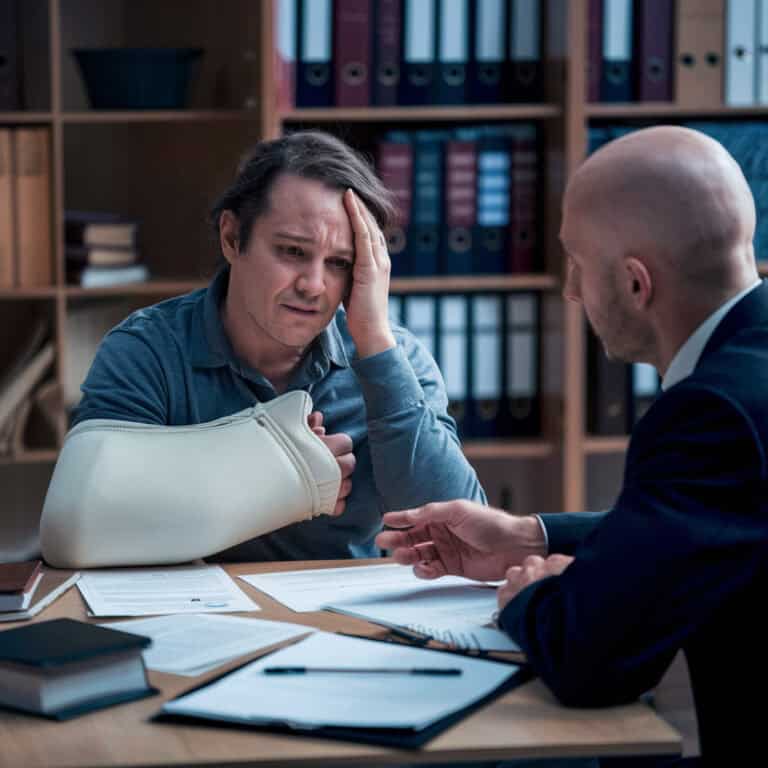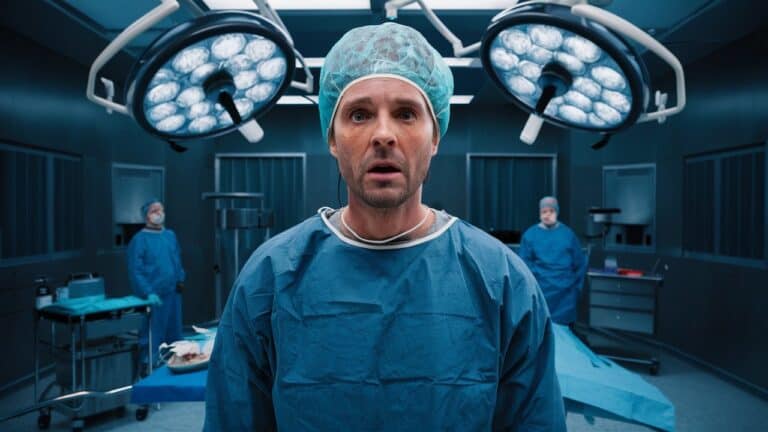Imagine cruising down the highway, your favorite tune humming through the speakers. Then, suddenly, bam—a sudden crash, metal twisting, glass shattering. In a blink, life flips upside down—literally and figuratively. Can car accidents cause PTSD? Let’s explore.
It’s no shocker that car accidents are nasty business; they jolt more than just our vehicles—they can rattle our very psyche to its core. And it makes you wonder: can car accidents cause PTSD? The answer is a firm affirmative.
We all know someone who’s been in one—or maybe we’ve been there ourselves—and the aftermath isn’t always just about physical scrapes or insurance claims. There’s an invisible wound too often overlooked—the mental scarring of post-traumatic stress disorder (PTSD).
In this deep dive, we’ll unpack how these traumatic incidents can lead to long-term psychological turmoil and what car accident survivors experience daily. But hold tight—we’re not stopping at problems here; by the end of this journey, you’ll have a map to navigate treatments and find hope on roads once thought impassable. Let’s explore the paths to healing together.
Table Of Contents:
- The Prevalence of PTSD Following Car Accidents
- Recognizing Symptoms of Post-Traumatic Stress Disorder
- Effective Treatments for Car Accident-Induced PTSD
- Navigating Legal Avenues After a Traumatic Car Accident
- Coping Mechanisms for Survivors with Car Accident Trauma
- The Long-Term Impact of Car Accident Trauma on Life Quality
- The Importance of Support Systems in Healing from Car Accident Trauma
- Educational Outreach on Car Accident-Related Mental Health Issues
- FAQs in Relation to Can Car Accidents Cause PTSD
- Conclusion
The Prevalence of PTSD Following Car Accidents
Imagine the screech of tires and a moment frozen in time when life changes forever. Car accidents can be a leading cause of PTSD, with around 3.5 million adults in the US experiencing its effects every year. It’s not just soldiers on distant battlefields; an estimated 3.5 million adults are hit by this invisible force annually, with civilians involved in car accidents being particularly vulnerable.
Car Accidents as a Leading Trauma Event
When we think trauma, our minds might dart to dramatic movie scenes or news headlines from war-torn areas. But zoom into everyday life and you’ll see motor vehicle collisions at center stage—the leading cause of PTSD among non-military folks. Men are especially likely to face this aftermath head-on, while women place it second only after sexual assault experiences.
The roads we travel every day can turn into sites where lives pivot dramatically; they’re dotted with potential triggers for those haunted by past crashes. The American Psychological Association shines light on how common these incidents really are: jarring enough to make anyone double-check their rearview mirror more often than necessary.
Intrusive Memories and Flashbacks
You’ve probably heard about flashbacks before—like unwanted reruns that play across one’s mind’s eye without any remote control to switch them off. These intrusive memories can hijack someone’s peace following a traumatic car incident, thrusting them back into that harrowing scene against their will—a cruel trick played by the brain trying to process shockwaves long gone but emotionally present.
Emotional Avoidance and Changes in Mood
Sometimes survivors build invisible walls around anything related to their ordeal—it could be avoiding certain streets or shunning conversations about driving altogether—just because reminders sting like salt in fresh wounds. Others may feel like emotional chameleons suddenly shifting colors; what once was vibrant happiness turns grey as moods swing unpredictably under post-traumatic stress’ shadowy influence.
No one should have to navigate such rocky terrains alone—which brings us back full circle—to why understanding the link between car accidents and PTSD matters so much for everyone cruising down life’s highways alongside us.
Car accidents are a leading cause of PTSD, not just for soldiers but also for everyday folks. Men and women alike can find themselves haunted by memories of the crash, changing how they feel and act long after the event.
Trauma from car crashes is more common than you might think; it’s why some people start avoiding certain roads or topics related to driving. Knowing this helps us support those affected as they travel life’s unpredictable paths.
Recognizing Symptoms of Post-Traumatic Stress Disorder
Picture this: you’ve been in a car crash. Now, every time you hear tires screech, your heart races and sweat beads on your forehead. That’s post-traumatic stress disorder (PTSD) knocking at the door—a psychiatric disorder not just for veterans but also for everyday folks like us who survive traumatic events such as motor vehicle accidents.
Intrusive Memories and Flashbacks
The mind can be a relentless movie projector, especially after highly traumatic experiences like car accidents. Survivors may have recurrent nightmares or flashbacks that seem to make them experience the trauma anew, so real they can’t tell it’s not happening again. These intrusive memories are common PTSD symptoms; they hijack one’s sense of safety, making even the comfort of their bed feel like the scene of an accident.
It doesn’t stop there—sudden sounds or even smells similar to those from the incident can trigger intense distress. It’s no wonder why people experiencing these symptoms might seek out a mental health professional. After all, getting jolted back into life-threatening moments isn’t exactly what anyone wants during dinner with family members.
Emotional Avoidance and Changes in Mood
You know how sometimes we avoid certain streets because it reminds us too much of where our first love broke up with us? Well, imagine feeling that way about any road resembling where your accident happened—that’s emotional avoidance for you. Folks grappling with PTSD after a car crash may steer clear from driving altogether—an example of accident avoidance—or perhaps duck away when someone brings up anything related to cars or crashes.
Mood swings aren’t uncommon either—survivors might find themselves swimming through waves of anger or plunging into pools of sadness without warning; think mood ring but less psychedelic colors and more gray clouds rolling unpredictably across their mental sky.
Car crashes can leave more than physical scars; they often cause PTSD, making everyday triggers like screeching tires a gateway to intense stress and flashbacks. It’s not just nightmares—smells or sounds might send you right back to that moment of trauma.
Avoiding roads or shunning driving altogether? That could be emotional avoidance—a sign of PTSD from your accident. And if you’re riding an emotional rollercoaster without a ticket, know it’s also part of the bumpy aftermath survivors face.
Effective Treatments for Car Accident-Induced PTSD
The road to recovery after a traumatic car crash isn’t just about physical healing; it’s also a mental marathon. For many, the journey involves overcoming post-traumatic stress disorder (PTSD), an unwelcome hitchhiker that can tag along after such highly traumatic events.
Cognitive Behavioral Therapy (CBT)
Cognitive therapy is more than mind games—it’s a scientifically backed process helping patients reframe and combat distressing thoughts. CBT has shown its mettle in enabling those haunted by their experience car accident trauma to disentangle themselves from intrusive memories. It challenges negative patterns and offers strategies akin to psychological judo, turning one’s own thoughts from adversaries into allies.
This type of treatment includes approaches like cognitive processing therapy, which you can learn more about at VA’s page on Cognitive Processing Therapy. Here individuals are taught how to unpack and understand the impact of their traumatic incident through structured sessions with a health professional.
Exposure Therapy’s Role in Recovery
If avoidance was an Olympic sport, PTSD victims would be gold medalists. But exposure therapy flips the script: rather than running away from fear-inducing cues related to the motor vehicle accident, patients face them head-on—but under controlled conditions so safe they could have training wheels. This method gradually dials down fear responses over time until memories lose their menacing edge.
Analogous to facing your fears—think bungee jumping without actually leaving solid ground—this approach allows survivors experience extreme emotions within safety nets woven by professionals versed in techniques like eye movement desensitization or group therapy settings designed for peer support as detailed by the American Psychiatric Association.
Finding effective treatments for car accident-related PTSD is crucial because we’re not talking small numbers here; millions are affected annually—with car accidents ranking as civilian life’s leading cause of this psychiatric disorder. So if you’ve been shaken up beyond what feels normal following a wreck—and especially if common symptoms persist—seek out help right away. A well-informed chat with your doctor might lead you towards options like anti-anxiety medications or tailor-made ptsd treatment plans designed just for you.
Recovery from car accident-induced PTSD is both a physical and mental challenge, but treatments like CBT help patients reframe negative thoughts. Exposure therapy allows facing fears in a safe space to reduce anxiety over time. Don’t ignore persistent symptoms—talk to your doctor about treatment plans.
Navigating Legal Avenues After a Traumatic Car Accident
After a car crash, you may experience more than just physical injuries; the emotional trauma can be equally debilitating. The emotional scars can be just as real—and sometimes even longer-lasting. If your mind keeps replaying that traumatic event, know this: seeking compensation for car accident-related PTSD is not only possible but often necessary to get your life back on track.
The Role of a Car Accident Attorney in Your Recovery Journey
An experienced car accident attorney at Pinder Plotkin understands the complexities surrounding post-traumatic stress disorder. They’ve seen how common symptoms like difficulty sleeping and persistent avoidance behaviors disrupt lives every day. These legal pros are skilled at proving the link between motor vehicle accidents and subsequent mental health challenges—crucial when it’s time to face insurance companies or courtrooms and seek compensation.
Partnering with an adept lawyer gives survivors experience-backed guidance through unfamiliar territory. From eye movement desensitization therapy bills to lost wages because everyday life became overwhelming, they’ll build a compelling case for why you deserve full reparation for both visible and invisible damages.
Gathering Evidence: Proving PTSD Impact Beyond Doubt
A crucial step toward getting compensated? Demonstrating how deeply the incident affected you. This is where medical professionals come into play—they’re your allies in detailing how PTSD symptoms have altered your world since that fateful day.
Your attorney will collaborate closely with healthcare providers—from those specializing in psychiatric disorders endorsed by entities like the American Psychological Association, to therapists practicing methods approved by organizations such as VA’s National Center for PTSD. Their testimonies help paint a vivid picture of your ordeal—a narrative powerful enough to sway decision-makers towards granting what’s fair.
Facing Financial Realities: Calculating Long-Term Needs
Beyond immediate treatments lie future considerations; something top-notch attorneys tackle head-on while advocating for their clients’ well-being long-term. Their financial acumen shines when estimating costs tied not only to ongoing therapies like cognitive behavioral therapy (CBT) but also potential career impacts due if say, high-stress environments become no-go zones. In essence, they don’t just fight battles—they strategize wars against injustice so trauma survivors won’t fret over future hurdles related directly or indirectly back-to-the-accident causes any longer than absolutely necessary.
After a car crash, it’s not just physical injuries that can throw your life off course. Emotional wounds like PTSD need attention too, and with the right lawyer by your side, you’ll have an expert fighting for compensation to cover both seen and unseen damages.
Your attorney will team up with medical pros to show how PTSD has rocked your world. They’re on top of their game in proving its impact—essential when dealing with insurance or court battles.
Lawyers aren’t only about winning today’s fight; they’ve got an eye on the future as well. They estimate costs for long-term care so survivors don’t stress over what comes next due to accident-related trauma.
Coping Mechanisms for Survivors with Car Accident Trauma
Life after a car crash can be a rollercoaster, and not the fun kind. You might find yourself struggling to get behind the wheel again or jumping at every honk in traffic. It’s tough when your brain keeps replaying that traumatic event over and over like a bad movie on repeat.
Getting back to normal after a car crash involves more than just physical healing; it’s also about mental health. Coping with PTSD after a car accident is all about finding what works for you. There are self-help strategies out there that can help manage symptoms without turning life upside down.
Ground Yourself When Intrusive Thoughts Hit
We’ve all had those moments where our thoughts run wild—like squirrels darting across the road of our minds. For survivors, these intrusive thoughts aren’t just pesky; they’re reminders of their trauma. To tackle them head-on, Healthline suggests grounding techniques. These bring you back to reality and away from distressing memories by focusing on your senses.
Breathe deeply while naming five things you see around you, four things you feel, three things you hear, two things you smell, and one thing taste-related—even if it’s just recalling how your morning coffee was an utter delight.
Create Your Stress-Defeating Squad
Support networks are superheroes in disguise—family members who listen without judgment or friends who make sure laughter remains part of everyday life—they’re essential for healing from emotional trauma caused by vehicle collisions.
Don’t hesitate to reach out; sharing feelings may seem as daunting as skydiving sans parachute but opening up allows others to provide support through group therapy sessions or simply being there when anxiety kicks in before taking another drive.
Rewrite The Narrative With Professional Help
Sometimes self-help needs backup—and that’s okay. Working with mental health professionals offers access to treatments like cognitive behavioral therapy (CBT) which helps rewrite those haunting narratives left behind post-car-crash into something more manageable.
Cognitive Processing Therapy (CPT), often recommended by experts such as the American Psychological Association (APA), is particularly effective for tackling challenging beliefs related to traumatic incidents.
If talking therapies sound about as appealing as swimming with sharks though consider this: medication options exist too anti-anxiety meds could be helpful companions along this bumpy journey so chat it up with medical pros—they’ve got insight worth hearing.
Life after a car crash can leave you on edge, but there’s hope. Ground yourself with simple techniques, build a strong support network, and don’t shy away from professional help to rewrite your trauma story.
The Long-Term Impact of Car Accident Trauma on Life Quality
When a car accident shatters the routine hum of everyday life, it can leave behind more than just physical scars. The persistent effects of car accident-related PTSD ripple through the lives of survivors like aftershocks following an earthquake. These tremors aren’t just felt in moments of stress or fear; they infiltrate every aspect, from work to relationships.
Imagine carrying around a backpack filled with bricks—this is what enduring post-traumatic stress feels like for many. Each brick represents challenges that come with living after a traumatic event: flashbacks during your daily commute, sudden panic at the sound of honking horns, or sleepless nights haunted by ‘what-ifs.’ For some people experiencing extreme difficulty sleeping becomes their new normal. They face battles against self-destructive behaviors and may feel disconnected from family members who struggle to understand this invisible wound.
A visit to the American Psychological Association’s website reveals that while PTSD symptoms vary widely among individuals, common threads include intense anxiety and intrusive thoughts disrupting one’s ability to function day-to-day—a profound testament to how deeply such emotional trauma cuts into personal well-being.
Treatment options have expanded beyond traditional therapy sessions too. Those afflicted might find solace in group therapy environments where sharing experiences can lessen isolation feelings or explore eye movement desensitization techniques designed specifically for treating traumatic memories. Anti-anxiety medications prescribed by medical professionals often complement these approaches but remember—it’s not about erasing history; it’s about learning how best to carry those bricks so they don’t weigh you down indefinitely.
For anyone caught in this stormy aftermath and seeking compensation for all losses endured—including quality-of-life hits—you’ll likely need someone who speaks both legal lingo and human empathy fluently: enter the car accident attorney at Pinder Plotkin. Their role isn’t simply about fighting insurance companies; it’s also guiding survivors through uncharted waters toward something resembling peace again—or maybe even finding solid ground where joy used to bloom before tragedy struck.
Car accidents can do more than harm the body; they often leave mental scars like PTSD, which affects everything from work to personal relationships. Treatment goes beyond therapy, with group support and innovative techniques helping lighten the load of this emotional baggage.
Facing PTSD after a crash is tough—you’re not just dealing with physical injuries but also fighting invisible battles every day. Luckily, treatments are evolving and legal experts offer both advocacy and understanding on your journey back to joy.
The Importance of Support Systems in Healing from Car Accident Trauma
When the rubber meets the road, healing from a car accident involves more than just bandages and bed rest. The emotional impact can be as crippling as physical injuries, with many survivors experiencing symptoms that point straight to post-traumatic stress disorder (PTSD). It’s like having an unwanted travel companion long after you’ve left the scene of the crash.
Beyond individual strength and resilience, it’s your pit crew – family members who provide that essential support network importance for recovery. They’re there when flashbacks hit harder than any airbag could cushion or when avoidance makes once-loved routes feel like no-go zones. Imagine them cheering you on through every lap of your recovery journey; their presence alone can shift gears towards a healthier mental state.
In this rough terrain where everyday life becomes intertwined with PTSD car accident trauma, tapping into group therapy sessions or one-on-one talks with health professionals might not always come first to mind—but they should. Just as you’d seek out a mechanic to repair your car after an accident, it’s essential to attend to psychological tune-ups too. Similarly, addressing psychological tune-ups is vital. A motor vehicle collision doesn’t only leave dents in metal but also imprints traumatic memories onto those involved.
This track isn’t meant to be ridden solo—your crew includes medical professionals equipped with treatment tools ranging from cognitive behavioral therapy (CBT) to anti-anxiety medications designed specifically for steering clear of PTSD symptoms following highly traumatic events such as car crashes. And let’s talk legal avenues; sometimes seeking compensation isn’t about revenge—it’s part of repairing what was damaged emotionally and financially. American Psychological Association stats highlight that around 3.5 million adults deal annually with this psychiatric disorder—that’s more common than we think outside military contexts.
No one should navigate these hairpin turns alone because together we ride stronger against the tide of post-traumatic stress following such disruptive incidents on our roads today. Mayo Clinic resources are yet another cog in this wheel offering guidance so don’t hesitate to reach out because remember—in unity lies strength.
Healing from car accident trauma goes beyond physical recovery; it’s crucial to care for your mental health too. Your support system—family, friends, and medical pros—is key in helping you overcome PTSD symptoms.
Treat your mind like a car needing repairs: Seek professional help with therapies and meds if needed, and don’t shy away from legal action as part of the healing process.
Educational Outreach on Car Accident-Related Mental Health Issues
Imagine the sound of screeching tires and shattering glass as an everyday drive turns into a life-altering event. The psychological trauma of car accidents can often lead to PTSD, a condition that has long-term effects. With traffic incidents leaving lasting impacts, there’s a growing push for motor vehicle collision awareness programs to shed light on this invisible injury.
Despite popular belief, war zones aren’t the only birthplaces of PTSD. In fact, car accidents have become one of its leading causes among civilians—a truth many overlook until they’re in the throes themselves or supporting someone who is. We see survivors experience extreme stress responses from intrusive memories to full-blown avoidance behavior, which makes educating the public about these symptoms crucial for early recognition and support.
The journey toward healing isn’t solely internal; it can lead through courtrooms too. That’s where knowing your rights comes into play—because let’s face it: battling unseen wounds while fighting legal battles is like trying to sing an opera while running a marathon—you need both stamina and expert guidance. This highlights why having a savvy car accident attorney by your side could be key in seeking compensation when daily life takes detours due to psychological roadblocks caused by traumatic events.
Coping Mechanisms for Survivors with Car Accident Trauma
Mental health professionals recommend strategies such as cognitive behavioral therapy (CBT) and exposure therapy—proven lifelines pulling individuals out of dark post-traumatic waters. But don’t forget self-help steps that are more than just band-aids over bullet holes—they’re vital practices paving roads back to normalcy.
Acknowledging PTSD after experiencing car trauma means understanding you might suddenly find yourself playing emotional hot potato with anything related to driving—or even freeze at every honk heard around corners. Having access to group therapy sessions or learning about eye movement desensitization techniques can provide solace amidst chaos because sometimes sharing burdens helps lighten them exponentially.
Car accidents can leave deep mental scars, leading to PTSD—knowledge often overlooked until it hits home. Understanding symptoms and rights is vital for healing.
Mental health pros advocate CBT and exposure therapy; don’t ignore self-help’s power on the road to recovery. Group sessions and new techniques offer comfort in tough times.
For those navigating post-accident life: you’re not solo. Resources like Healthline provide guidance for facing invasive thoughts and moving towards repair.
FAQs in Relation to Can Car Accidents Cause PTSD
What are the symptoms of PTSD after a car accident?
Symptoms include relentless flashbacks, nightmares, edginess, and mood swings that stick around long after the crash.
Can a car accident cause mental trauma?
Absolutely. The sudden shock and fear during a collision can trigger lasting psychological distress for many survivors.
How long does trauma last after car accident?
Trauma duration varies; some shake it off quickly while others grapple with its effects for months or even years.
How long does it take nerves to heal after car accident?
Nerve healing post-accident is unpredictable—it could be weeks to over a year depending on injury severity and treatment response.
Conclusion
Car accidents can disrupt your life, but they don’t have to define it. Yes, car accidents can cause PTSD; that’s a reality we’ve acknowledged today.
Be vigilant for the signs: flashbacks, avoidance, mood swings—they’re indicators that you might need assistance. Treatment options like CBT and exposure therapy are available to help you regain control.
Your journey may be challenging; legal battles and coping strategies introduce layers of complexity. However, understand this: recovery isn’t just a possibility—it’s well within your reach.
Seek support from loved ones or professionals as you confront these challenges head-on. Your mental health holds as much significance as physical healing after enduring such highly traumatic events.
You’re not alone on the path toward normalcy. Take one day at a time, rely on your support network, and embrace the therapies that prove effective for you—because reclaiming your peace of mind is worth every step forward. Can car accidents cause PTSD? Let’s delve deeper into that





